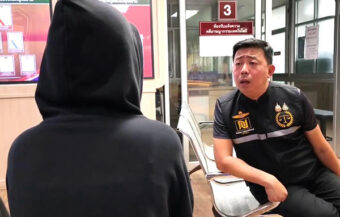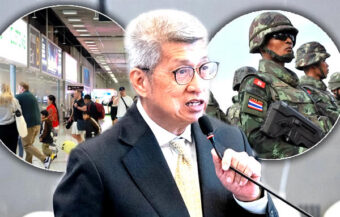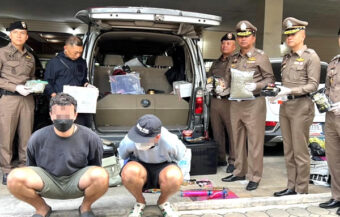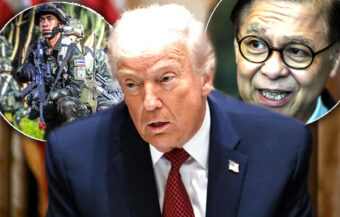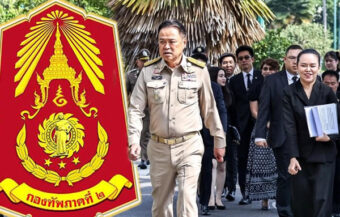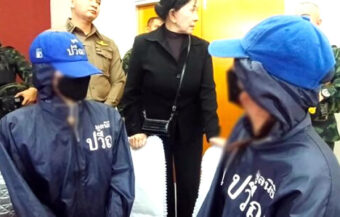Sweden’s $600M Gripen jet deal with Thailand is on hold after Thai jets struck Cambodian targets, as part of last week’s border conflict. Foreign Minister refuses approval amid conflict concerns, threatening Thailand’s air force modernisation and forcing a rethink of military partnerships and plans.
A $600 million fighter jet deal between Thailand and Sweden is now at risk. Sweden’s Foreign Minister, Maria Malmer Stenergard, confirmed she will not yet approve the sale due to rising tensions on the Thai-Cambodian border. Just days before, Thailand deployed Gripen jets in combat for the first time—sparking alarm in Stockholm. The deal, set to be signed in August with Prime Minister Paetongtarn Shinawatra attending, includes advanced jets and aerospace cooperation. It was fast-tracked by Acting Prime Minister Phumtham Wechayachai after Thailand rejected a U.S. offer for F-16s. Now, geopolitics and Sweden’s strict arms policies threaten to derail Thailand’s push to modernise its air force and expand regional influence.
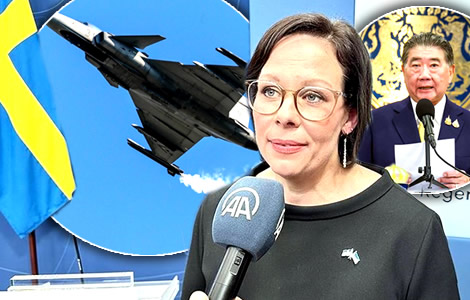
A major fighter jet deal between Thailand and Sweden is now in serious jeopardy. The agreement had been over a year in the making and was seen as a centrepiece of Thailand’s defence modernisation plan. However, recent events on the Thai-Cambodian border have cast a long shadow over the project.
The Royal Thai Air Force (RTAF) used Swedish-made Gripen fighter jets in live combat against Cambodian targets last week. This marked the first combat deployment of Gripen aircraft anywhere in the world. As a result, Sweden’s government is now reassessing the proposed sale.
Foreign Minister Maria Malmer Stenergard told Breaking Defence that she could not currently support the new deal.
Swedish foreign minister says no current support for Thailand Gripen deal amid border conflict
She explained that Sweden is “closely monitoring developments” along the border. So far, the Swedish government has not issued a formal block. Nevertheless, the minister’s comments are being interpreted as a warning.
Under Swedish export law, all arms deals must be approved by the Inspectorate of Strategic Products (ISP). The ISP is part of the Foreign Ministry and applies some of the strictest regulations in Europe. It evaluates political stability, human rights conditions and possible end-use scenarios before granting licences.
In this case, the Thai deployment of Gripens in combat raises serious questions. Although Thailand described the operation as defensive, Sweden must now consider whether it violates previous terms of use. The Gripen has been used in training and joint NATO exercises, but never in live war zones.
Importantly, the RTAF confirmed that the jets were used in cross-border strikes. According to Air Marshal Prapas Sornchaidee, the targets were legitimate military positions that posed an immediate threat. He insisted that all actions followed international law and proportional rules of engagement. Furthermore, he cited the UN Charter to justify Thailand’s actions.
Thai air force defends Gripen cross-border strikes, citing international law and immediate military threat
Still, not everyone is convinced. Cambodian media outlets were quick to criticise the strikes. The Phnom Penh Post claimed that Sweden had already suspended the sale. It noted that this was the first time Gripens had caused real-world casualties. This is unlikely to be true and can be treated as part of Cambodia’s propaganda offensive.
The Thai-Cambodian conflict last week sparked widespread regional concern. ASEAN diplomats have called for calm. A ceasefire was declared on July 28, just days after the clashes began. However, diplomatic tensions remain high.
Meanwhile, Thailand had only recently announced its intention to expand its Gripen fleet. In June 2025, the RTAF revealed plans to acquire 12 new JAS-39E/F jets. The first batch, consisting of three single-seat and one twin-seat aircraft, was set for approval in August. The budget for the first phase is ฿19.5 billion, or about US$596 million.
Air Chief Marshal Punpakdee Pattanakul said the new jets would secure Thailand’s aerial capabilities for the next three decades. In addition, he stressed that the Gripen project supports broader goals, including defence-industry cooperation with Sweden and the EU.
Thailand plans major Gripen expansion to boost air power and deepen industrial cooperation with Sweden
He emphasised that the program includes not only aircraft, but also electronic warfare systems, long-range missiles, and digital communications tools. These tools would expand Thailand’s air combat and surveillance capabilities.
Moreover, the procurement deal includes significant offsets. These range from direct military technology transfers to indirect investments in education, cybersecurity and industry.
For example, Link T data-sharing systems are included in the package. These allow for seamless communication between RTAF units and expand command-and-control capabilities. Other benefits include pilot training, spare parts, and advanced logistics systems.
The Air Force also confirmed that the contract complies with Thai law. It was approved by the Ministry of Defence and follows all guidelines for government-to-government military agreements.
Nevertheless, Sweden now holds the final decision. Without a formal export licence from Stockholm, the sale cannot proceed. That license is unlikely to be granted while the border conflict remains unresolved.
Sweden’s final export license needed for Gripen sale remains stalled amid ongoing border tensions
Adding complexity, Sweden joined NATO in March 2024. While previously known for its neutrality, the country is now integral to the defence of Europe from Russian aggression. That alignment may influence how Sweden handles arms exports to conflict-prone regions.
Significantly, Thailand is seen as a significant non-North Atlantic Treaty Alliance (NATO) United States military ally.
Thailand had previously rejected a U.S. proposal to supply upgraded F-16 jets. Washington had earlier denied Thailand’s request to purchase the F-35, citing infrastructure and operational limitations. Many Thai officials believed the denial had deeper political motives.
After those events, Thailand turned to Sweden. The move was described as both strategic and symbolic. It aimed to diversify Thailand’s military partnerships and assert greater autonomy.
Air Force leaders stressed that the Gripen deal supported not just national defence, but also industrial and diplomatic goals. “We’re building long-term capability,” said Air Chief Marshal Seksan Kantha.
Thailand pivots from US jets to Sweden’s Gripen to diversify military ties and assert greater autonomy
In addition, the deal was meant to be signed during a state visit to Sweden by Prime Minister Paetongtarn Shinawatra. That visit is now in doubt. Swedish silence on the matter has made Thai officials increasingly anxious.
According to Air Marshal Kitkhuan Sapad, the contract included 14 offset projects. Seven are direct, such as tactical systems, and seven are indirect, such as cyber development and training. These elements were designed to strengthen the Thai industry.
From a legal standpoint, the deal is awaiting reviews by the Attorney General’s Office and the Department of Treaties and Laws. Budget offices are also reviewing the plan, with Cabinet approval expected by mid-August.
However, all of this depends on Sweden’s final approval. Without it, Thailand may be forced to reconsider its procurement strategy. Possible alternatives include South Korea’s KF-21, China’s J-10CE or a renewed U.S. offer.
Thailand’s Gripen deal now hinges on Sweden’s approval, as alternatives could disrupt plans and raise costs
Any such pivot would bring delays and added costs. It would also disrupt years of investment in Sweden-based defence systems. Thailand’s existing Gripens would additionally become harder to maintain and upgrade.
Thailand’s Gripen fleet is deeply integrated into its defence network. A shift away from Saab would require significant changes in logistics, training and software infrastructure.
Sweden, for its part, faces a dilemma. The country risks being seen as complicit in regional conflict if it approves the sale. Yet rejecting the deal could harm a key bilateral relationship and hurt Saab’s business.
Thai air force opts for Swedish Gripen fighter jets in a rebuff to the United States and its F16 jets proposal
This case is being watched closely by other nations considering the Gripen. These include the Philippines, Colombia and the Czech Republic. Sweden’s decision here could shape future sales.
For now, the deal remains in limbo. No contract has been signed. No jets have been shipped. Everything depends on how Sweden resolves its internal debate over arms control and ethics.
Unless clarity emerges soon, Thailand’s modernisation plans may be delayed indefinitely. Gripens may remain parked—grounded not by budget, but by geopolitics and morality.
Join the Thai News forum, follow Thai Examiner on Facebook here
Receive all our stories as they come out on Telegram here
Follow Thai Examiner here
Further reading:
US turns down Thai request for advanced F35 fighter jets but offers less expensive F16s and F15s
China could be an economic time bomb sitting on Thailand’s doorstep as Evergrande collapse nears
With Omicron hovering, firms already suffering a cash flow crunch with the economy again in peril
UK Foreign Secretary visits Bangkok after AUKUS security pact further raises tensions with China
Trade pact with Hong Kong as Thailand negotiates both Chinese and new western trade relationships
US Ambassador resigns as Biden Presidency starts with growing tensions with China over Taiwan
RCEP deal agreed as India opts out – busy Bangkok ASEAN summit concludes on a low key
Chinese FM to visit Thailand in a Covid battered world of raised tensions and potential conflict
Thailand and US aim for a new more ‘proactive’ trading relationship as ambassador meets Prayuth


